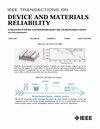From Ground to Orbit: A Robust and Efficient Test Methodology for RISC-V Soft-Cores
IF 2.3
3区 工程技术
Q2 ENGINEERING, ELECTRICAL & ELECTRONIC
IEEE Transactions on Device and Materials Reliability
Pub Date : 2025-02-13
DOI:10.1109/TDMR.2025.3537718
引用次数: 0
Abstract
As traditional space-grade computing systems struggle to meet the increasing computational demands of modern space missions, RISC-V emerges as a promising alternative due to its open-source and highly customizable nature. However, the extensive hardware customization options in RISC-V introduce complexity in validation, making it challenging to ensure system reliability. This paper introduces a robust methodology for validating RISC-V-based systems under accelerated radiation beams, focusing on test uptime, leveraging Commercial Off-The-Shelf (COTS) FPGA devices, which offer flexibility and cost-effectiveness, to enable concurrent hardware and software development. We demonstrate how our methodology offers a comprehensive approach for testing heterogeneous systems on FPGAs, balancing thorough integration with cost-efficiency and test robustness. During our experiments with accelerated neutrons to assess the resilience of RISC-V cores, our approach guaranteed the correct delivery of 100% of the packages, while minimizing system downtime during radiation testing by reducing the Test Fixture SEFI cross-section.从地面到轨道:RISC-V 软核的稳健高效测试方法
由于传统的空间级计算系统难以满足现代空间任务日益增长的计算需求,RISC-V由于其开源和高度可定制的特性而成为一个有前途的替代方案。然而,RISC-V中广泛的硬件定制选项引入了验证的复杂性,使得确保系统可靠性具有挑战性。本文介绍了一种在加速辐射波束下验证基于risc - v系统的强大方法,重点关注测试正常运行时间,利用商用现货(COTS) FPGA设备,提供灵活性和成本效益,以实现并行硬件和软件开发。我们展示了我们的方法如何提供一种全面的方法来测试fpga上的异构系统,平衡全面集成与成本效率和测试鲁棒性。在我们用加速中子评估RISC-V内核弹性的实验中,我们的方法保证了100%的封装正确交付,同时通过减少测试夹具SEFI横截面,最大限度地减少了辐射测试期间的系统停机时间。
本文章由计算机程序翻译,如有差异,请以英文原文为准。
求助全文
约1分钟内获得全文
求助全文
来源期刊

IEEE Transactions on Device and Materials Reliability
工程技术-工程:电子与电气
CiteScore
4.80
自引率
5.00%
发文量
71
审稿时长
6-12 weeks
期刊介绍:
The scope of the publication includes, but is not limited to Reliability of: Devices, Materials, Processes, Interfaces, Integrated Microsystems (including MEMS & Sensors), Transistors, Technology (CMOS, BiCMOS, etc.), Integrated Circuits (IC, SSI, MSI, LSI, ULSI, ELSI, etc.), Thin Film Transistor Applications. The measurement and understanding of the reliability of such entities at each phase, from the concept stage through research and development and into manufacturing scale-up, provides the overall database on the reliability of the devices, materials, processes, package and other necessities for the successful introduction of a product to market. This reliability database is the foundation for a quality product, which meets customer expectation. A product so developed has high reliability. High quality will be achieved because product weaknesses will have been found (root cause analysis) and designed out of the final product. This process of ever increasing reliability and quality will result in a superior product. In the end, reliability and quality are not one thing; but in a sense everything, which can be or has to be done to guarantee that the product successfully performs in the field under customer conditions. Our goal is to capture these advances. An additional objective is to focus cross fertilized communication in the state of the art of reliability of electronic materials and devices and provide fundamental understanding of basic phenomena that affect reliability. In addition, the publication is a forum for interdisciplinary studies on reliability. An overall goal is to provide leading edge/state of the art information, which is critically relevant to the creation of reliable products.
 求助内容:
求助内容: 应助结果提醒方式:
应助结果提醒方式:


